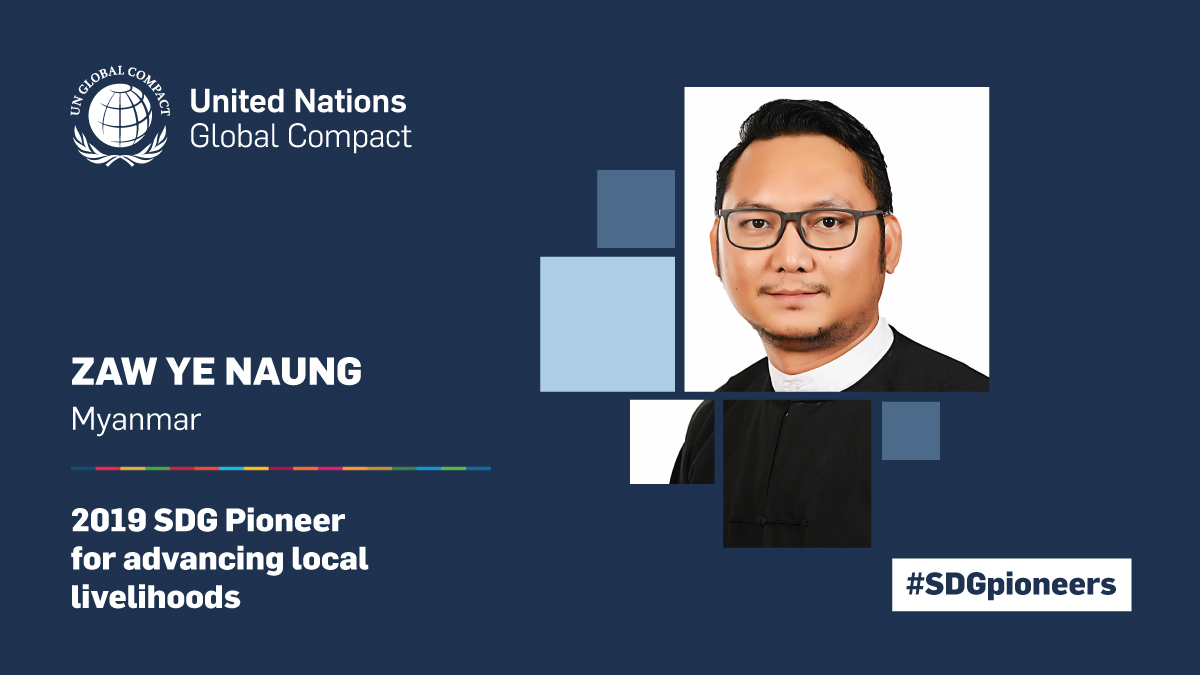An SDG Pioneer for advancing local livelihoods

Zaw Ye Naung is using a micro-farming business model to keep Myanmar farmers financially free as they supply their communities with fresh, free-range eggs.
At the same time, the co-founder of Shwe Taung Nyo Gyi organic poultry farms is advancing seven Sustainable Development Goals and creating micro-business ecosystems that support rural farmers through financing, technology and ready markets. The company also works with farmers in villages in Shan State, Kayin State, Yangon and the Mandalay region to grow corn, beans, sesame and rice for the poultry feeds.
Zaw learned about the Global Goals during his previous career in financial services. Impressed by the concepts, he used them as a foundation to set up a business model in 2017 that now supports nearly 100 farmers with steady jobs and incomes.
The micro-financing process starts with each poultry farmer receiving a budget of US$ 1,400. That covers the cost of 200 chickens, the poultry house and six weeks of chicken feed. The farmer, at the same time, invests 1,800 square feet of land. Shwe Taung Nyo Gyi then trains the farmers for about four weeks: they learn how to build the farm, feed and care for the chickens. Once farm operations begin, Shwe Taung Nyo Gyi acts as a consultant and buys about 90 per cent of the eggs from the farm, usually about 160 eggs per day, or 4,800 eggs a month. This gives each farmer about US$ 700 in regular monthly income. The company deducts its financing of US$ 1,400 from each farmer over a 14-month period. After that, the farmer owns the poultry farm and has a sustainable form of income.
Zaw’s business model also empowers women as the farmers’ wives make bamboo baskets to package the eggs. One woman, for example, makes about US$ 270 per month by turning out 1,000 bamboo baskets.
Altogether, the model helps move Myanmar toward seven Global Goals. These include Goal 1 (No Poverty) by providing farmers with high incomes; Goal 2 (Zero Hunger) offering sustainable food production; Goal 3 (Good Health and Well-Being) producing natural eggs laid by free-range, cage-free chickens; Goal 5 (Gender Equality) as the farmers’ wives make reusable bamboo baskets to package the eggs; Goal 8 (Decent Work and Economic Growth) by sustainably boosting the economy; Goal 10 (Reduced Inequalities) by following human rights and local government labour regulations; and Goal 15 (Life on Land) by avoiding chemical fertilizers and antibiotics to maintain the region’s biodiversity.
Shwe Taung Nyo Gyi is a participant in the United Nations Global Compact and was a member of the Global Compact Network Myanmar. Zaw met with the Myanmar Network coordinator for guidance and ideas. He also learns from the farmers, vendors and other stakeholders involved in the process of delivering sustainable agriculture in Myanmar.
Zaw is intent on extending the message of sustainable development throughout the country. He carries out workshops in villages, especially in Shan State, a largely rural state that is the largest of Myanmar’s 14 administrative districts. The workshops zero in on the Global Goals and provide participants with details about organic farming.
Zaw is 34 years of age.
